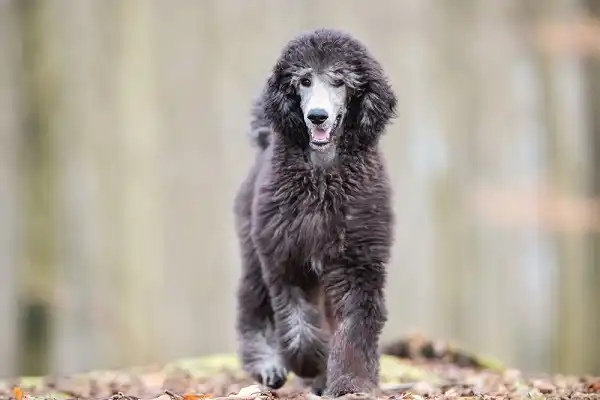Are you looking for a companion that will bring unconditional love and immense joy to your home? If so, then the poodle might just be the way to go. With its intelligence, energy, and playful attitude, the poodle is an ideal choice for most families in search of a furry friend. This informative blog post will tell you everything you need to know about poodles—from the different types of breeds available to essential questions when selecting one.

Poodle Description
Poodles come in three main varieties – standard, miniature, and toy. There are a variety of sizes and colors available to choose from, ranging from classic black to chocolate brown and apricot. Both their coats and skin can vary in texture depending on the breed, ranging from curly to wiry-haired or flat-coated. Poodles are known for being incredibly intelligent, loyal, loving pets with excellent temperaments that make them great family pets. With proper training and socialization, these dogs can learn commands quickly and have an eagerness to please. They have also been used for a variety of jobs such as herding livestock, participating in agility competitions, and serving as service dogs for people with disabilities. Poodles require regular grooming sessions to maintain their luxurious coat and prevent matting or tangling of fur. They need daily exercise to stay healthy and happy; however, they do not need excessive amounts of activity as other breeds might.
Poodle Habitat
Poodles can live in a variety of environments, depending on their size and breed. Standard poodles, for instance, are suited for homes with backyards or open spaces where they can move around and exercise. Poodles typically require less room to live in, but still need daily walks outside and plenty of mental stimulation. Miniature poodles tend to be slightly more active than toy breeds and thus require larger spaces to roam. Generally speaking, all three varieties do best when living indoors with their families as they crave companionship and love being part of the family unit. No matter the breed, it is important to consider the climate when considering a poodle’s habitat. Poodles have thick coats that are designed to keep them warm in cold climates; however, if they live in areas with hot climates, they may become overheated easily if not supervised closely while outdoors or provided with adequate shade while out on walks. In addition, due to their coats’ tendency to tangle and mat easily, it is important that owners groom their poodle regularly so as not to have any mats or tangles form which can cause skin infections or discomfort for the poodle.
Poodle Diet
Poodles require a balanced diet to stay healthy and happy. A diet consisting of high-quality, grain-free dry food is ideal for poodles as it contains all the nutrition needed for growth and development. Poodles tend to be picky eaters, so owners should take care to provide them with a variety of foods that they like. This can help ward off boredom and keep their interest in their food. In addition to kibble, poodles can benefit from occasional treats such as tiny pieces of cooked chicken, beef, or fish. Other types of treats like low-fat fruit or vegetable slices are also great options for snacks. It’s important to remember that treats should be limited, as too many can lead to weight gain and other health complications. These dogs also need access to fresh water at all times in order to stay hydrated and prevent dehydration throughout the day. It’s important not to overfeed poodles as this can lead to obesity which puts them at higher risk for diabetes, heart disease, joint pain, and a shorter lifespan overall. Owners should always consult with a veterinarian regarding their poodle’s dietary needs based on breed type, size, age, and activity level in order to ensure they are providing them with the right nutrition for optimal health.

Poodle Size
Poodles come in a range of sizes, depending on the breed. Standard Poodles are the largest and can weigh anywhere from 45-70 pounds and stand 15-22 inches tall. Miniature Poodles are somewhat smaller, weighing 15-17 pounds and standing 10-14 inches tall. Toy Poodles are the smallest, with adults growing to be between 4-6 pounds and standing 8-10 inches tall. Although their size may be different, all three varieties have a similar body type that is defined by their long, thin legs; deep chests; long heads; almond-shaped eyes, and curly coats.
Poodle Lifespan
Poodles have a typical lifespan of between 10 and 18 years, depending on the size of the breed. Miniature Poodles usually live the longest, with an average life expectancy of 15 to 17 years. Standard Poodles generally have a lifespan of around 12 to 14 years while Toy Poodles typically live for 10 to 12 years. While this is the average lifespan, many poodles can live longer depending on their diet and lifestyle. A well-balanced diet rich in vitamins and minerals, regular exercise, and plenty of mental stimulation are important components for maintaining your poodle’s health throughout its lifetime. It is also important to schedule regular vet visits to ensure that your pet stays up-to-date with routine vaccinations, as well as any other health issues they might be dealing with. Adequate grooming and brushing are also essential for keeping your poodle’s coat healthy and free from mats or tangles. In addition to proper care, good genetics play an important role in determining a poodle’s lifespan. If you are considering getting a poodle puppy, make sure that you do your research on their parents’ history of health problems so you can be sure that you’re adopting a healthy pup who will likely live a long life!
Poodle Behavior
Poodles are known for their intelligence, loyalty, and loving personalities, making them great family pets. They are highly trainable, obedient, and eager to please their owners, making them easy to train with patience and consistency. Poodles also have a strong sense of self-preservation which makes them very alert and watchful guardians that can be relied upon to sound the alarm if there is something suspicious. These dogs have an abundance of energy and require regular exercise in order to stay healthy both mentally and physically. Playing fetch or going on long walks provide them with the necessary physical stimulation while mental games like hide-and-seek give them the mental stimulation they need. Socialization is also important for poodles as it allows them to become more familiar with other people, animals, sounds, and environments allowing them to become better adjusted to different situations. Poodles are generally good with children when introduced properly at an early age. However, due to their size, they may not be suitable for households with small children as they could accidentally be injured by rough play or handling. They can also become possessive over their toys and food so teaching children how to respect their dog’s personal space is important from puppyhood onwards.

Poodle Speed
Poodles are not typically known for their speed, but they can move with surprising agility when they need to. Miniature and Toy Poodles are often quicker due to their small size and lower weight, while Standard Poodles may be slower because of their larger physique. Poodles have an average sprinting speed of approximately 12 mph (19 km/h). This means that a miniature poodle could run a mile in about 8.5 minutes using a full-out sprint. However, these speeds usually only occur in short bursts since the breed does not possess the stamina of more active breeds such as greyhounds or huskies. Poodles can move quickly when the situation calls for it, however, making them great dogs for activities such as obedience or agility courses. They have light but powerful builds that make them well-suited for quick turns and jumps, as well as for running on uneven terrain. In addition to their athleticism, poodles have an incredible amount of energy that needs to be expended daily in order to keep them healthy and prevent behavioral issues from arising.
Poodle Hunting
Poodle hunting is an activity that can bring out the best of your poodle’s natural abilities. They were originally bred to be great water retrievers and this skill translates perfectly into a fun, safe, and exciting hunting experience. Poodles are highly intelligent, and agile, and have a strong sense of smell which makes them excellent hunters. While they may not have the stamina to hunt all day, they can easily handle short bursts of activity. When hunting with your poodle it is important to keep in mind their size and strength so as not to overexert them. Start off slowly by introducing your pup to shorter hunting trips with shorter periods of activity. As your poodle gains more experience and confidence you can gradually increase the length of trips and intensity of activities. Make sure that when you’re out searching for a game you provide plenty of breaks for your pet so they don’t become too tired or overwhelmed by the experience. Poodles are also very obedient dogs making them quite easy to train for hunting tasks like marking games and retrieving downed birds or other animals. With proper training, they can become adept at tracking scents and navigating terrain, making them great hunting partners who will help make your trip successful!

Conclusion
Poodles have long been admired for their intelligence, beauty, and athleticism. They are versatile dogs that can excel in a variety of activities from agility to hunting. With the right care and training these smart pooches can make wonderful lifelong companions who will be ready to join you on any outdoor adventure! Whether you’re looking for a fun-loving companion or an active hunting partner, a poodle could be just the right fit for you. So if you want to add a little “poodle power” to your life, consider bringing home one of these amazing animals today!
Frequently Asked Question


